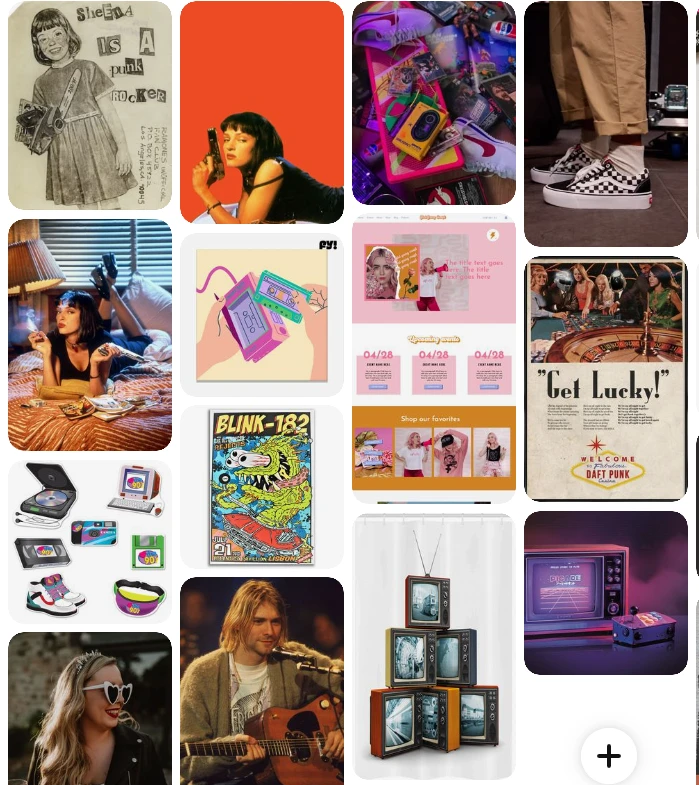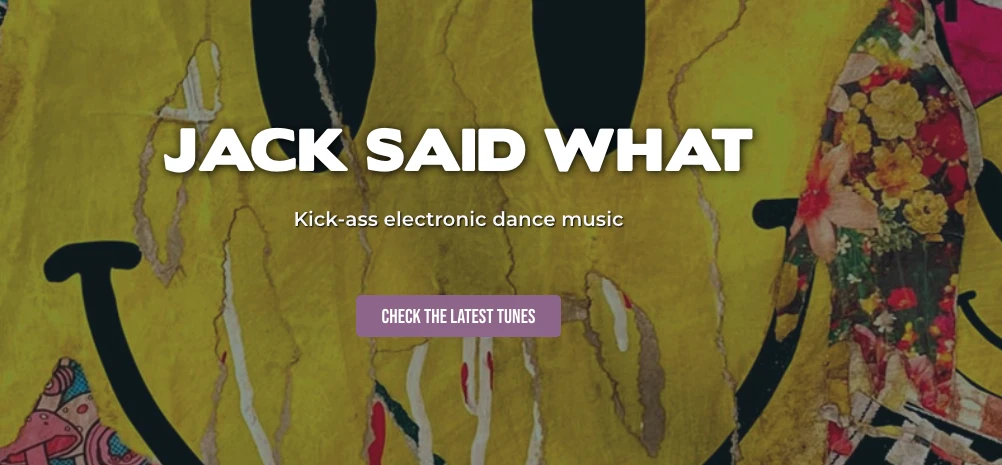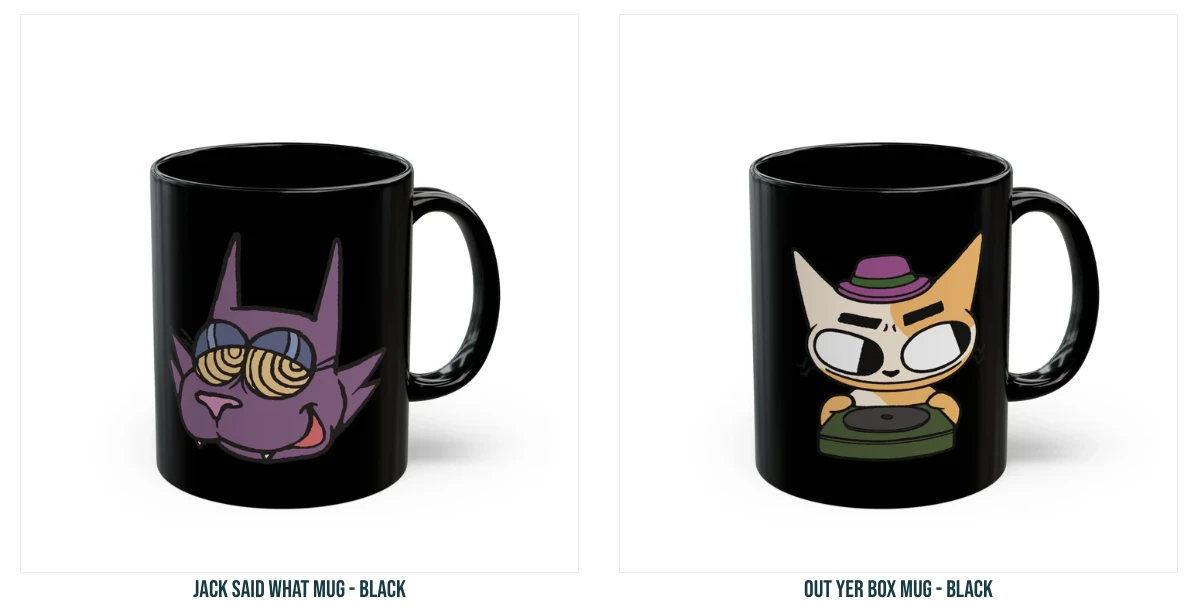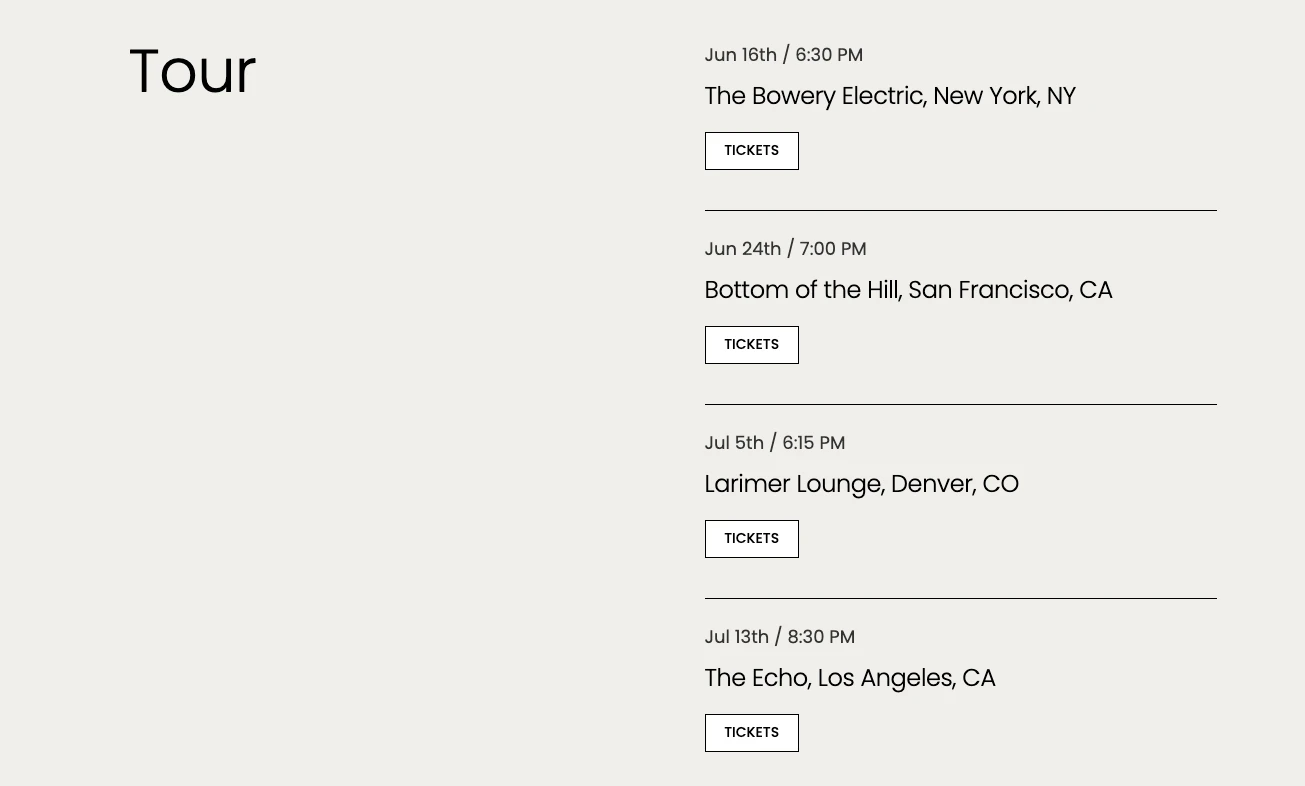Guide: Digital marketing for musicians (+ free content marketing plan)
 Mandar and Ruta, paid ads team
Mandar and Ruta, paid ads team
Quick question, would you believe us if we told you that your skillset as a musician actually makes you the perfect marketer?
Whether it’s engaging with fans over SoundCloud or storytelling through Instagram, marketing is really about connecting with people—and you already do that every day with your music!
Now what about us? What do we know about digital marketing for musicians? Well, as an email marketing platform, we do digital marketing on the daily, but just to make sure all these strategies are relevant to you we’ve even had independent musicians review this article.
By the time you finish, you’ll have some solid music marketing strategies at your disposal to help you turn passive listeners into superfans.
We’ve also created a full 5-week content marketing plan to help you with your next album release.
Now, let’s get to those independent musician-approved strategies.
Does marketing even work for musicians? Ask Justin Bieber, The Weeknd, Calvin Harris…
You didn’t get started in music to do all this marketing stuff, but what most musicians eventually discover is that your music is a product and you need to sell that product.
But the great news is this: Marketing is no longer the super expensive, exclusive thing it used to be, concentrated in the hands of a few Armani-suit-wearing producers and music industry executives.
Independent musicians have more power than ever to get their music in front of fans and explode their fanbase. Justin Bieber posted videos of himself singing on YouTube and got signed at the tender age of 14. Calvin Harris was discovered by sharing his songs on MySpace. The list goes on and on…
In short, marketing works and it works best when you come at it from a place of authenticity. Don’t worry about getting fancy, if anything it’s likely to put more people off. Fans crave a certain rawness that they don’t see from big-label artists.
We hope we’ve convinced you that marketing is worth it! Now let’s look at the specifics. We’ve lined up 7 musician-specific strategies to help give your digital marketing game a serious power-up. From Spotify marketing to how to brand yourself—this is your digital marketing blueprint.
7 digital marketing strategies for musicians
Here are 7 proven strategies you can use to grow your musician brand across multiple channels including email, TikTok, Spotify, Bandcamp and more. Each tip has been reviewed and approved by independent musicians. 🎸
1. Create a stand-out brand (with tips from a professional branding specialist)
Building a brand personality is much more than colors and a cool logo. Your branding is an extension of your values, genre and how you want your listeners to feel when they interact with your music. It also makes selling merch a lot easier if people love your aesthetic.
According to Emmelie Coulson, an independent branding strategist, start by understanding who you are and what your brand needs to express.
Ask yourself:
Who are you as an artist?
What makes you unique?
Who should be blown away by your brand? Who are your truest fans; your Swifties, Beatlemaniacs, or Youngbloods?
These answers form the foundation of your brand's "creative brief": A guide for building your visuals.
Start with inspiration
To get a sense of your brand's visual direction, Emmelie suggests creating a Pinterest board to gather ideas. Look for colors, fonts, images and graphics that resonate with your sound and style, but don’t limit yourself to just music branding. Explore other areas like fashion, nature or interiors for fresh ideas.

Tailor your brand to fit your genre
Your branding should reflect your music. “A dreamy indie artist might choose soft lighting and whimsical imagery, while a metal band would opt for dark tones and intense visuals,” says Emmelie. Understanding your audience’s expectations is crucial. Consider what attracts your target fans and how your visuals can convey your music’s mood and energy.
MailerLite customer and electronic dance music (EDM) label, Jack Said What, really nails their branding. Their branding is as bold and electrifying as their genre, with visual nods to club culture and a strong 1990s aesthetic to resonate with Gen X and Millennial fans.


Think beyond colors
While colors are important, Emmelie notes that other visual elements, like logos and fonts, play a major role in building a cohesive brand. Your logo is the "face" of your brand, so create variations that work across different platforms and sizes.
For fonts, pick 2-3 that represent your vibe. “A bold, heavy font might work for headings, while a clean, readable font works better for body text,” says Emmelie. Make sure your fonts reflect your music’s style—choosing a whimsical font for a punk band would feel off, but it might be perfect for a folk artist.
Following these steps can help you create a brand that feels aligned with your music, personality and what your fans will adore. It also means you can apply those same visual elements to all your marketing material.
2. Create your central hub (aka your website)
Without a website, information about you is scattered across various social media or streaming platforms which can be frustrating for fans trying to find specific information. Your website doesn’t have to be complicated, you can start with a simple one-page website and then build it out as you go along.
As a starting point, you want to make sure your website includes:
Streaming links (Soundcloud, Spotify, etc.,) where people can listen to your music
Upcoming gigs
Merchandise (if you sell it)
Social media links
An email newsletter sign-up form
Here are 3 free website builders with a quick list of pros and cons to help you decide which one is best for you.
MailerLite
MailerLite (hey that’s us!) 👋 helps you build a website that looks like it was created by a pro designer. The combination of templates, pre-built sections, and intuitive styling options make it a powerful yet easy-to-use solution.
Pros
Very easy to build beautiful sites
Prebuilt blocks that are perfect for musicians like our Events block to add your upcoming tour dates
Advanced tools like forms on free plan
Plenty of customization options
Create and reuse styles
Built-in email marketing
Cons
Templates require paid plan after first month
Blog feature requires paid plan

Wix
Wix is a powerful visual website builder that lets you drag and drop elements anywhere on the page. This makes it easy to create pretty much any website design you want. The free plan is also generous and gives access to all the main Wix features except the ability to accept payments.
Pros
True drag-and-drop interface
Powerful form builder
Tons of templates
Access to most features on the free plan
Comprehensive brand styling options
Form builder with loads of options
Easy-to-use responsive design tool
Cons
Intrusive Wix branding
AI tools were hit-and-miss
E-commerce features require a paid plan
Carrd
Carrd is a website builder for creating modern, single-page websites and landing pages. Creating beautiful designs is easy thanks to the user-friendly customization options: We’ve built plenty of free sites with the tool and are always happy with the results.
Pros
Easy way to create beautiful one-page sites
Super quick setup
Modern website design
Tons of templates
Easy-to-use animation features
Paid plans are very cheap
Free templates available
Cons
One-page sites only
No pre-built layouts
Forms require a paid plan
Now let’s see how you can build a loyal fanbase on social media.
3. Social media marketing for musicians: Top tips from a social media strategist
We caught up with our own social media wizard, Chiara, to ask her for some top tips on what to post on social media to drive engagement and views on TikTok, Instagram, and YouTube.
Share reaction videos
Record yourself playing your song for a friend or family member and record their reaction like Morgan St Jean has done here.
Record a cover version of a popular song in your genre
This can really boost your visibility and expose you to tons of new fans. Country singer Josiah and the Bonevilles has racked up more than 25,000 likes on his cover of Justin Bieber’s Ghost. The song has also generated almost 56 million streams on Spotify which would earn him around $190,400 according to Streaming Calculator!
Get fans to use your audio on their videos
Morgan St Jean is the queen of this strategy. She layers parts of her song, usually the chorus or hook, over videos that best represent the lyrics. She’s done this particularly well for her song Do it like a girl, which celebrates the achievements of women. This gives fans the opportunity to do the same and promote her music with their content.
Play virtual gigs
Use the live feature to start a virtual gig with your fans. They can request songs and ask you questions in real time.
Share behind the scenes of your music
Let your fans get a glimpse into what you’re working on. Josiah and the Bonevilles does this in a really personalized way by typing a letter to his fans sharing details about his journey writing and recording his full album which is authentic and touching.
Create a solid link in bio page
A link in bio page helps direct your social media followers to everything from your new music to concert tickets. Instead of cluttering up your bio with multiple URLs, consolidate them into one easy-to-access spot.
Make sure you include links like:
Other social media platforms
Where to listen to your latest single or album
A shop link where fans can buy your merch or records
Upcoming tour dates and tickets
A newsletter sign-up form to grow your email list (with MailerLite you can embed your form directly in your link in bio page!)
4. Email marketing for musicians: Give your fans a VIP experience
One of the main reasons so many creators and artists love email marketing is that it gives them a direct, 1:1 relationship with their community and fans. While social media is a great tool, email marketing allows you to bypass algorithms and speak directly with your fans. What’s more, social media accounts can get hacked and you could lose tens of thousands of followers overnight—yikes!
There are tons of ways that you can use email marketing as part of your marketing strategy as a musician. Here are some to consider:
Promote exclusive content and new releases
Take a leaf out of MaillerLite customer, Dolores Forever’s, book. This pop duo uses their newsletter to drive sales to their exclusive releases, like the commentary version of their new album.

Promote upcoming gigs
Ever feel FOMO over a gig that's too far away? Help your fans avoid that frustration by using segmentation in your gig promotion emails. Segmentation means organizing subscribers by criteria like interest or location. With MailerLite, you’ll already have data about where your subscribers are located. But if you want to get more specific and segment by city, you can add custom fields to your sign-up forms or send surveys to group subscribers by location.
When promoting a gig, use dynamic content to show the announcement only to subscribers nearby. It's easy to add dynamic content with MailerLite's Drag & drop or rich-text editor. Just select the block you want to make dynamic, click the eye icon, and select the right group. Here’s what it looks like to only show a block of content to subscribers located in Belfast.


Spotify uses this same tactic to show their users which of their favorite artists are playing gigs near them.

Send your most engaged subscribers free downloads and previews
Reward your loyal fans with a special treat. Andrej Surgutanov, producer at the independent label Amulet of Tears will use Bandcamp to generate a free download code for one of his artists’ songs to share with his most engaged subscribers. If they listen to the digital version for free, he’s found that they’re more likely to buy the physical product (e.g. a vinyl record).

Build your music empire with MailerLite
Reward loyal fans, build hype around your album releases and use email to grow a stronger community on a platform you own.
5. Spotify marketing: the good, the bad and the ugly
Making it on Spotify can catapult your career into the big time which is why there’s a ton of advice about how to do it, and not all of it is good… Before we dig into how to boost your discoverability and engagement on Spotify, let’s talk about the dark underside of Spotify marketing.
Should you pay to be on a Spotify playlist?
Be careful if someone offers you guaranteed streams for a fee—these are usually fake. Fake streams come from bots or click farms and can lead to serious consequences because it’s a type of financial fraud. One person in Denmark even went to jail for it. Paying for streams just isn't worth it, even if it boosts your streams temporarily. Now that we've cleared that up, let's focus on what you should do instead.
Use Countdown pages as part of your pre-release strategy
Build hype around your next album release with the help of Spotify’s Countdown pages. Your fans can pre-save your music, preview your tracklist, watch Clips, and buy your latest merch. Using this type of pre-release strategy right there on Spotify makes it more likely that your fans will actually listen to your release—70% more likely to be exact!
Use direct links to specific songs on social media
Instead of sharing your Spotify artist page or album link on social media, share direct links to specific songs. This reduces friction for new listeners who might not know where to start. When shared alongside personal anecdotes, video snippets, or behind the scenes content, listeners are more likely to engage with the individual track.
Regularly release ‘Spotify Canvas’ videos
The short looping videos that appear with tracks on Spotify's mobile app, known as Canvases, are more important than you might realize. Engaging, well-produced Canvas videos not only make your tracks more visually appealing, but Spotify has stated that they increase track shares by up to 145%—not bad!

6. Boost your visibility on SoundCloud
While Spotify is the world’s number 1 streaming service, it lacks the type of 1:1 engagement and interaction with fans that you get with SoundCloud. And with top artists like Billie Eilish and Post Malone both being discovered on the platform, it’s well worth the investment.
Anatomy of a great SoundCloud Profile
Let’s start at the beginning: your profile. A well-optimized profile should tell listeners what type of music you produce, include your most important links, and show off your branding.

Adrian Barrin’s profile, aka Unseen, is a great example to follow.
He’s included a descriptive genre in his profile banner, “Melodic House & Techno” which helps with search engine optimization (SEO)
He’s included a photo of himself in the banner so people can recognize him
His bio includes his record label and his main Spotify playlist
His bio also gives the listener a great overview of his work and style, which will resonate with fans of the genre and also help boost his SEO
His own music is front and center in the Spotlight section (rather than full of reposts from other artists’ music)
Use comments to boost engagement
Use your comments section to start conversations with your listeners. Ask for feedback, share stories behind the music, or prompt discussions around certain parts of the track.
Strategic reposting partnerships
Use SoundCloud’s repost feature strategically by partnering with other independent artists in your niche. Find artists with similar fanbases and agree to repost each other’s new tracks. It’s an easy way to introduce your music to a fresh audience without paid promotion.
Use this sparingly, though, as you don’t want your own profile to be full of reposts that distract from your own music.
Engage with the comment sections of popular tracks
One underutilized strategy is engaging in the comment sections of popular tracks, especially those within your genre. Leave thoughtful and authentic comments on tracks you genuinely like. This can draw attention to your profile from listeners with similar tastes and increase organic traffic back to your own music.
Optimize for discovery with track titles and descriptions
SoundCloud is also a search engine and optimizing your track titles with relevant keywords can boost discovery. For example, include genre names, mood descriptions, or thematic keywords that might match what users are searching for. In your descriptions, give context about the song, the creative process, or its inspiration—this creates a deeper connection and drives engagement.
7. Bandcamp marketing: Nurture relationships with your fans
Similar to SoundCloud, Bandcamp is a marketplace for musicians designed to foster a closer relationship between artists and their fans. Fans can follow artists, get updates on new releases, and interact with artists directly. Follow these tips to engage your fanbase and drive more listeners to your page.
Use Bandcamp’s fan accounts
Many artists overlook that Bandcamp lets fans create accounts, too. Encourage your existing fanbase to create Bandcamp fan accounts to follow you, purchase your music, and share their collections. When a fan buys your music, it appears in their collection, which their followers can see. This helps expose you to new audiences through Bandcamp’s organic community feature.
Tag your music wisely
Bandcamp’s search functionality heavily relies on tags. Instead of just using broad genre terms like "rock" or "pop," use more niche and specific tags that relate to your sound (e.g., "lo-fi dream pop," "post-punk revival"). This will help you show up in searches where potential listeners are looking for exactly what you offer. Experiment with tags based on moods or thematic elements as well.
Throw a listening party
Make your fans feel special by throwing a live listening party, like acoustic guitarist Yasmin Williams. The main draw for fans is that they get to engage with you directly and get their questions answered or request songs. Use it to build hype around your album release and nurture deeper connections with your fans.

Get featured on Bandcamp daily
Bandcamp Daily features articles about independent artists and genre-specific roundups. Reach out to Bandcamp editors or submit your music for feature consideration. If your release fits into a niche genre they often promote, this could give you a great visibility boost, as Bandcamp Daily gets a lot of traffic.

Use the community feature
Got a new release? Use Bandcamp’s community feature to message your followers directly. Andrej Surgutanov uses this strategy when his label, Amulet of Tears, drops a new release. “Bandcamp does have an automatic notification system, which sends a simple email informing the artists’ followers about a new release. However, sometimes a more personal message from the artist can create a connection special enough to make fans purchase.”

Done-for-you 5-week content plan for your upcoming album release
Okay, we’ve covered a lot in this article and we know it can be a little overwhelming. We’d love to cut out some of the guesswork for you and give you an exact content plan that’ll build hype for your upcoming release.
Week 1: Tease the announcement
| Platform | Day | Content |
|---|---|---|
| Monday | Share a teaser image of the album cover (blurred or cropped) with a cryptic caption, hinting at a big announcement. | |
| YouTube | Tuesday | Post a short teaser video (15-30 seconds) introducing the project with atmospheric visuals or sound snippets. |
| TikTok | Wednesday | Use the teaser audio of a song from the album and post a short, engaging clip (rehearsal, behind-the-scenes). |
| SoundCloud | Thursday | Update your profile bio to mention the upcoming release, but don’t give away too much detail. |
| Friday | Send an email teasing a big announcement next week, including a countdown or a "stay tuned" message. |
Week 2: Official announcement
| Platform | Day | Content |
|---|---|---|
| Monday | Album cover reveal post with the release date and a countdown sticker in your stories. Encourage sharing. | |
| YouTube | Tuesday | Publish a video talking about the album’s creation process or inspiration. Can be a sit-down chat or montage. |
| TikTok | Wednesday | Share a creative behind-the-scenes clip (studio footage, funny moments) with one of the album’s tracks in the background. |
| SoundCloud | Thursday | Share an exclusive snippet (30-second preview) of one of the songs on the upcoming album. |
| Friday | Send out the official album announcement, countdown timer, include pre-save links, exclusive details, and merch bundles (if available). |
Week 3: Build engagement
| Platform | Day | Content |
|---|---|---|
| Monday | Post a tracklist reveal (carousel or creative graphic), and encourage fans to guess which songs they’ll like most. | |
| YouTube | Tuesday | Share a studio session video of recording one of the key tracks (2-3 minutes). |
| TikTok | Wednesday | Post a track challenge: encourage fans to duet or remix a portion of one of your songs on TikTok. |
| SoundCloud | Thursday | Pin a comment on your profile or playlist with a teaser for the album, encouraging feedback and comments. |
| Friday | Q&A email: Answer fan questions about the album, and include a sneak peek of an unreleased lyric or story. |
Week 4: Final push and release day
| Platform | Day | Content |
|---|---|---|
| Monday | Countdown posts and stories with behind-the-scenes moments or album trivia. | |
| YouTube | Tuesday | Post a music video teaser or short performance video to build excitement before the launch. |
| TikTok | Wednesday | Go live on TikTok and talk about the album, play snippets, answer questions. |
| SoundCloud | Thursday | Share a private link with a few select fans or influencers to build word-of-mouth buzz. |
| Friday | Release day email: Direct link to the album on streaming platforms, include personalized messages for your fans. |
Post-Release: Celebrate and Engage 🎊
| Platform | Day | Content |
|---|---|---|
| Weekend | Thank-you post with fan reactions, stories sharing reviews, fan posts, or social proof from the launch. | |
| YouTube | Weekend | Behind-the-scenes footage of the release day or a video explaining the meaning behind specific songs. |
| TikTok | Weekend | Run a TikTok challenge related to one of the album’s tracks (dances, covers, interpretations). |
| SoundCloud | Ongoing | Keep promoting the album by posting a playlist with your new album and other favorite tracks. |
| Monday | Post-release reflections: Share your personal thoughts on the release, thank fans, and mention upcoming events. |
You’ve got your marketing plan, what’s next?
If you still don’t have a dedicated website or an email list we’d recommend starting there so you’re building an audience on platforms that you own. Social media is an important channel to invest in but a devastating consequence of only relying on social media channels is what happens if they ever get hacked. You could lose a huge portion of your fanbase in a matter of seconds.
Take a proactive approach to protect the relationship with your fans by building your email list today.
Build your music empire with MailerLite
Reward loyal fans, build hype around your album releases and use email to grow a stronger community on a platform you own.

